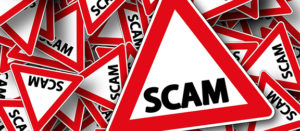Checks from the IRS arrived this month, unemployment insurance in weeks, and promises of more relief for seniors lies ahead. But do not think scammers are unaware. Scams are replicating faster than the coronavirus. As of late-March, the Secret Service, FBI and FTC began warning Americans to be on higher guard for scams targeting personal information and money. Since then, they have raised the ante, warning Americans – especially seniors: Trickery is getting sophisticated. See: https://www.fbi.gov/coronavirus.

Fear tied to COVID-19 has people concerned over health and finances. We all track progress on both fronts – retreat of the virus and restarting of the economy. Scams are getting more creative, convincing and pernicious. Here are six on the prowl.
1) Email “phishing” scams. Steer wide of suspect emails – especially attachments encouraging download of new health, financial, safety, mask-availability, or “how to cope” advice. Scammers know you are concerned. They want access to your computer to install malware, ransomware, sift your files for social security, banking, credit card, registration and password information. You would not invite a stranger into your house; do not invite one onto your computer. If you have even the slightest doubt, do not click!
2) Virus vaccinations. They do not exist – so let’s start there. Secret Service reports a flush of emails offering false cures, vaccinations, inoculations, and useless remedies for COVID-19. These are not to be believed. Experts put a vaccine a year out.
3) Health gear scams. Crooks know you want N-95 masks, disposable gloves, sanitizer, bacteria-killing soap, immunity-boosting vitamins, plus hard-to-get health gear and medicine. They know you want toilet paper, paper towels, disinfectants, and some edge on the virus. Before you click or order from a company, check the company. Trusted sources are better than the unknown. Products ordered blindly are often useless, faulty, dangerous or simply never come.
4) The FBI is also finding “cybercriminals impersonating officials at the Center for Disease Control (CDC), World Health Organization (WHO),” as well as other health authorities. Peddlers of junk get “cease and desist” letters from the Federal Trade Commission (FTC), but they may get your money first. Tricks include vague and inaccurate descriptions, mislabeling, misbranding, and practices like describing a product as US-made when it is not.
5) Heartstring scams. A raft of cyber-scams surround pulling heartstrings, especially targeting older Americans who feel responsible, have moral compass or give to charities. Your demographic and online presence tell people about you. Crooks parrot back what you care about.
6) IRS Payment Scams. An immediate scam relates to IRS payments. The payments, including to retirees, will come shortly. The IRS issued special anti-scam guidance for seniors, worth reviewing. Special attention by seniors – is warranted. Deposits come without action. In rare cases, if no prior IRS filing exists, a “newly designed secure portal” exists at “IRS.gov.” Checks may also arrive by mail. Under no circumstances should anyone give direct deposit or banking information” to other than the IRS “secure portal.”
IRS “reminds retirees who don’t normally have a requirement to file a tax return that no action on their part is needed to receive their $1,200 economic impact payment,” and “seniors should be especially careful during this period.”
IRS “reminds retirees – including recipients of Forms SSA-1099 and RRB-1099 − that no one from the agency will be reaching out to them by phone, email, mail or in person asking for any kind of information to complete their economic impact payment,” rebate or stimulus payment. If you get a call, it is not the IRS.
How can you be sure the IRS knows you exist? Most of the time we do not ask, but here it is worth asking. Because the IRS “is sending these $1,200 payments automatically to retirees” based on past IRS information, which means “no additional action or information is needed.”
What else? Be wary of anyone using terms like “stimulus check” or “stimulus payment,” since the official term is “economic impact payment.” Seniors are warned against anyone asking for them to “sign over their economic impact payment check,” use an expediting service, reaching to them “by phone, email, text or social media,” or seeking “verification of personal and/or banking information” to “speed up” payment. Beware “bogus checks,” requiring information to cash.
Tax Fraud and Identity Theft. Secret Service warns: “Coronavirus is a prime opportunity for enterprising criminals because it plays on one of the basic human conditions — fear.” The result has been identity-theft scams. FTC warns appeals that seem “too urgent,” or have misspelled words.
For protection beyond not opening suspicious emails, officials suggest ideas for avoiding tricksters. Does that website have “HTTPS” notation? If not, it may not be an “established URL domain descriptor.” Do you see a subdomain, like brand followed by “store.com” – rather than brand and .com? Is there a merchant review? Does the website’s domain in a browser pop a “certificate error?” These are all signals.
Bottom line: Scammers multiply when society is awash in fear, worry, volatility and uncertainty. They rush to capitalize on what we do not know and want to know, do not have and want to have, expect and are unclear about.
In the end, trust what you know and suspect the rest. If something sounds too good, urgent, targeted, cheap, fast, or preys on emotion – walk a circle. Seniors are ripe for scammers, so think twice – maybe three times – before you click. Checks are coming, more relief in sight, but scammers are out and about. Do not let them trick you.
Article courtesy of By Robert B.Charles with AMAC
